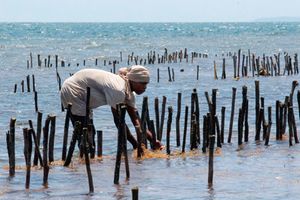
Demonstrators protest on Harambee Avenue on June 12, 2025 demanding justice for Albert Ojwang who died in police custody at Nairobi's Central Police Station.
This is my home. The land I was raised to love, not only in words but in action. My mother, Wangari Maathai, taught me that patriotism is not passive — it is a living, breathing action. You nurture it. You protect it. And you speak up for it, regardless of public opinion.
Yet in the brutality we have witnessed, especially over the past year, I have often wondered what is becoming of this place we call home? The Kenya we genuinely love, invest in, and work hard for is starting to feel increasingly unfamiliar and frightening.
Nearly a year has passed since protests over the 2024 Finance Bill first erupted. This week they flared again, sparked by the senseless killing of Albert Ojwang, a young man whose only “offence” was expressing his opinion.
Albert’s death has become a rallying cry, a painful reminder that the right to speak one’s mind is now, for some, a matter of life and death.
I remember the days when public land was seized with impunity, activism was a punishable act, truth bent to power, and speaking up could cost you your life.
Those were the days when courage was the only currency our parents had. Weren’t those days meant to be behind us? And yet, they believed there was a future where justice would prevail.
Though demonstrations had already begun, it was June 25, 2024 that seared itself into our national memory. Our brothers, sisters and children took to the streets with little more than their voices, their courage, and the Kenyan flag.
They marched not out of recklessness but out of resolve. They held up the flag not to burn it, but to remind us what it stands for. They crossed barricades in full conviction.
Abductions and disappearances
What followed was a national reckoning. The price of protest proved devastating. Too many young Kenyans paid with their lives.
I remember reading their names, watching candles flicker at vigils I supported, and feeling an ache that words cannot capture.
A name is never just a name. Behind each one was a heartbeat, a dream, a family in despair, a mother’s hopes, a father’s pride. A future we will never know.
Kenya ni home. That refrain echoes in my mind daily.
Over the past year I have stood in solidarity with youth leaders who are standing tall despite relentless pressure.
Month after month they have continued to show up, speaking out and dreaming aloud even when the price has been arrests, abductions, and disappearance. Their resilience astounds me. Their creativity of turning pain into poetry and resistance into art, redefines activism for the world.
Yet the images of parents weeping for sons and daughters, stolen in acts of unspeakable violence, are unbearable. There is no grief more harrowing than that of a mother or father robbed of their child, and no healing when justice is absent and truth withheld.
I cannot begin to comprehend what fractures a person’s conscience so deeply that they would beat another adult human - no different than their brother, sister, son or daughter - with such brutal cruelty.
New kind of patriotism
But what I know, what we must all know, is that these survivors, and those who did not survive, deserve not only our mourning, but our relentless demand for justice.
But what unsettles me just as deeply is the absence of moral courage among those entrusted with power. Where are our lawmakers, our leaders, our courts when the fabric of society tears this violently? Must every cry for justice be met with quiet complicity?
Must we scream into a void while those in power avert their eyes? Surely, surely - someone among them must rise and say, “ENOUGH!” Someone must affirm, “This is not who we are. This is not who we will become.”
Because in moments like these, silence is not neutral, it is betrayal. And justice must not only be blind - it must be brave! Today I see that courage reborn.
Our young leaders have inherited a long tradition of activism: from independence fighters to environmental defenders - and they are carrying it forward with fresh wisdom.
We must honour them, not with empty words or token gestures, but by listening, protecting them and standing up for them. By creating real avenues for dialogue. By meeting their demands with dignity rather than force.
Albert Ojwang’s voice was silenced, but his message endures: every Kenyan deserves the right to speak, dream, and dissent without fear. The test of our nationhood is whether we protect that right - especially when it makes us uncomfortable.
Let us not grow numb to sorrow. Let it instead forge a new kind of patriotism - rooted in empathy, in justice, in an unshakable belief that Kenya can be better and will be better because we refused to give up on her.
Ms Mathai is the MD for Africa & Global Partnerships at the World Resources Institute and Chair of the Wangari Maathai Foundation







